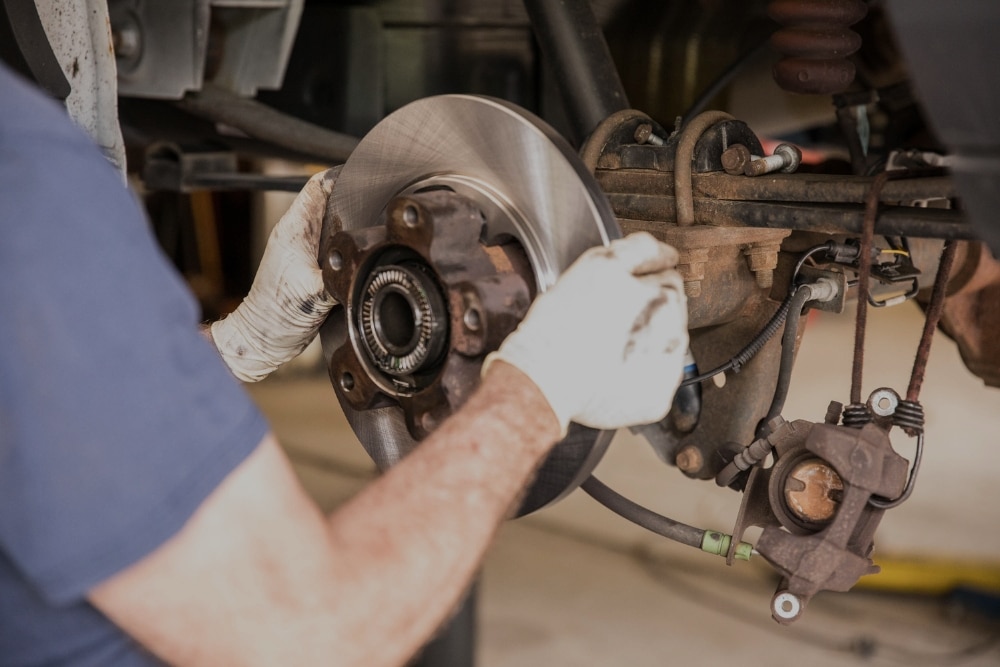It’s not the distance, it’s the stops that do it. If your daily drive includes Chicopee traffic on I-391, Memorial Drive, or East Main Street, your brakes are under constant pressure, working harder than they would on open highways. From red lights and school zones to merging lanes and crosswalks, stop-and-go driving creates repeated, high-friction situations that wear down your brakes faster than most people realize.
At E&G Automotive, we often hear from drivers who are surprised to learn their brake pads or rotors are already worn, despite having relatively low mileage on their vehicles. The truth is, city driving takes a different kind of toll. Your braking system is doing more than stopping your car, it’s managing heat, load, and repetition every time you slow down.
Here’s what you need to know about why your brakes might be wearing out sooner than expected and what you can do about it.
The Real Reason City Driving is Tough on Your Brakes
Chicopee’s roadways are filled with intersections, merging traffic, pedestrian zones, and red lights. The nature of city driving forces your brakes to work harder and more often. While highway driving allows long, steady stretches with minimal braking, city driving keeps your foot constantly moving between the gas and brake pedal.
Here’s what’s happening:
- Frequent stops wear down brake pads faster than longer coasting or gradual slowing.
- Braking in tight spaces requires more pressure, especially during last-minute stops.
- Short commutes don’t allow enough time for the braking system to cool down between cycles.
When your brakes generate heat from friction, that heat builds up. If it doesn’t have time to dissipate, it breaks down the materials in your pads and rotors more quickly.
How Heat Wears Down Your Brakes
Friction is how your brakes stop your car, but it’s also what slowly eats them away. Every time you press the brake pedal, the pads squeeze the rotors and create heat. If you’re braking frequently, especially in traffic, that heat builds up and stays trapped, damaging your components over time.
Overheated brake pads can begin to glaze, meaning they harden and lose their effectiveness. Your stopping power drops, and the risk of damage to the rotors increases. This is a leading cause of premature brake wear for Chicopee drivers, particularly those who frequent stop-and-go routes such as Memorial Drive and East Main Street.
The Extra Weight You’re Probably Carrying
Brake wear increases when your vehicle carries more weight. Whether it’s passengers, work tools, groceries, or even just a fully packed trunk, that added weight means more stopping force is needed, and your brakes are doing all the work.
If you frequently travel on hilly terrain, such as the access points around I-391, the pressure on your brakes multiplies. Descending a slope requires sustained braking, which increases both heat and wear.
This is why we recommend regular car brake inspections, even if your vehicle’s mileage seems low. It’s the type of driving and the conditions you’re driving in that matter most.
Are You Braking More Than You Think?
Let’s try something. Think about your last drive:
- How many stop signs or lights did you pass through?
- Did you make quick stops behind slow or merging drivers?
- How often did you coast freely without touching the brakes?
Now, consider how often those stops were spaced only seconds or blocks apart. In a place like Chicopee, where short trips, school zones, and crowded roads are part of daily life, braking becomes second nature. But that constant foot-on-the-pedal behavior adds up fast.
Even if your total mileage is low, your brake system is under more stress than it would be on long, steady highway drives. Multiply those quick stops by the number of days you’re on the road, and it becomes clear how brake components wear down, quietly and quickly, before you even notice a problem.
Why Front Brakes Wear Out Faster Than Rear Brakes in City Driving
If you’ve ever been told that your front brakes need replacing, but your rear brakes are still fine, there’s a good reason. In most vehicles, the front brakes handle 60–70% of the stopping force. This is because when you brake, the car’s weight shifts forward, putting more load on the front tires.
In stop-and-go traffic, this effect is amplified. With constant starts and stops, your front brake pads and rotors are working harder and getting hotter. That’s why they wear out more quickly and often need to be serviced more frequently than the rear brakes.
Keeping both the front and rear systems in balance is key. If one wears down more than the other, your vehicle may pull to one side, or the overall stopping distance could increase. During a brake inspection, a skilled technician will measure wear on both ends and make sure the system is balanced, responsive, and safe.
Don’t Rely on Dashboard Lights Alone
Your brake warning light is important, but it’s more of a last-resort signal than an early alert. By the time the light comes on, the issue has often progressed to the point where immediate repair is needed. Relying on the warning light alone could mean you’re catching the problem too late.
Instead, pay attention to these subtle but meaningful signs:
- A soft or spongy brake pedal that feels less responsive
- High-pitched squealing or metallic grinding when braking
- Vibrations or pulsing through the brake pedal
- The car pulls slightly to one side when slowing down
- A noticeable increase in stopping distance
These symptoms often appear well before the warning light does, and they’re your cue to schedule an inspection. Addressing them early can prevent more severe damage, such as warped rotors, worn calipers, or even brake fluid contamination. Acting at the first sign of trouble is not just safer, it’s also more cost-effective in the long run.
Where to Go for Trusted Brake Repair in Chicopee, MA
At E&G Automotive, we know how Chicopee’s stop-and-go traffic wears down your brakes faster than you’d expect. That’s why we offer brake services designed to keep you safe and confident on the road.
- Expertise: Our ASE-certified technicians, including Master Techs, inspect the full brake system, not just the pads, to catch issues early and get the job done right the first time.
- Quality Parts: We use only high-quality parts and materials to ensure your brake repairs last and perform the way they should.
- Digital Inspections: Every visit includes a digital vehicle inspection (DVI) with photos and clear notes, so you can see exactly what we see and make informed decisions.
- Customer Satisfaction: With over three decades of serving Chicopee drivers, we focus on clear communication, honest recommendations, and a no-pressure experience.
- Convenience and Comfort: We know auto repair can disrupt your day. That’s why we offer a comfortable waiting room, loaner vehicles, shuttle service, pick-up and drop-off options, and an after-hours drop box to make your visit as seamless as possible.
- Peace of Mind: All brake services are backed by our 3-year/36,000-mile warranty, giving you confidence long after you leave our shop.
When it’s time for a car brake inspection, trust the team that puts your safety, comfort, and satisfaction first. Learn more or schedule your next service by visiting our Brake Service and Repair page.
FAQs About Brake Wear and City Driving
How often should I have my brake fluid checked?
Brake fluid should be checked during every oil change and replaced every 2 to 3 years, or as recommended by your vehicle’s manufacturer. Over time, it can absorb moisture, which reduces braking efficiency and contributes to internal corrosion.
Do automatic and manual transmissions affect brake wear differently?
Yes. Manual transmission drivers often use engine braking (downshifting) to slow down, which can reduce wear on the brake pads. Automatic vehicles rely more heavily on the brake system to slow and stop, especially in city driving.
Can using cruise control help reduce brake wear?
Cruise control can help reduce brake usage on highways by maintaining a steady speed. However, in city traffic like Chicopee’s, cruise control isn’t practical and doesn’t help, since frequent stops require manual braking.
Is it safe to drive with slightly worn brakes?
Even if your brakes still feel responsive, slightly worn components can compromise stopping distance and performance in emergencies. Worn pads also risk damaging the rotors, leading to more costly repairs. It’s best to address any wear early.
What causes brake rotors to warp, and can it be prevented?
Warping often occurs from excessive heat buildup due to hard or frequent braking. It can also result from improperly torqued lug nuts or poor-quality rotors. Prevent warping by using high-quality parts, avoiding aggressive braking, and having your wheels properly installed and torqued.
Schedule Your Brake Inspection Before It Gets Worse
Brake wear doesn’t happen all at once, it builds over time with every red light, stop sign, and slow roll through Chicopee’s busiest streets like East Main Street and I-391. If your daily routine includes stop-and-go traffic or short trips, your braking system is working harder than you think. At E&G Automotive, we help drivers catch the early signs of brake wear before they become costly repairs. Visit us at 159 Granby Rd, Chicopee, MA 01013, or call 413-474-6791 to schedule your brake inspection today and drive with confidence.

